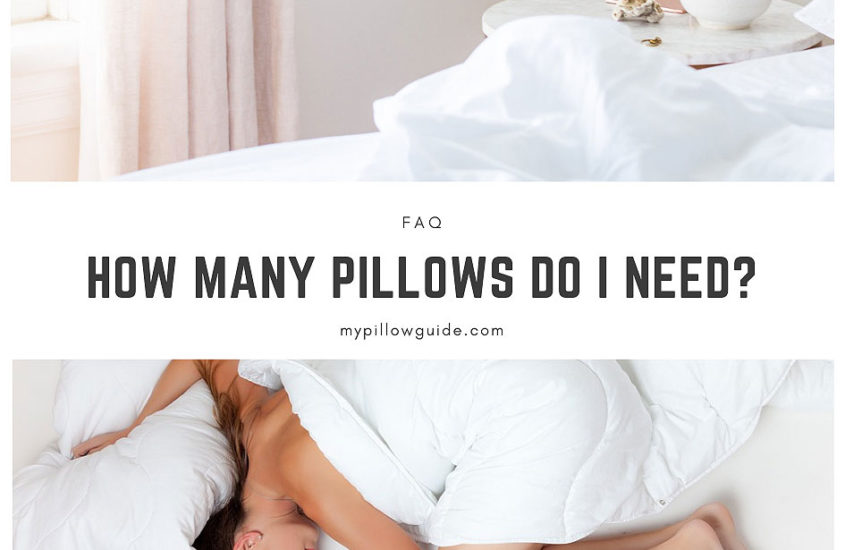How Many Pillows Do I need?

How Many Pillows Do You Need to Get a Good Night’s Sleep?
Let me tell you a little story. One year, when people asked me what I wanted for Christmas, I said pillows. At that time I had just two pillows and was sleeping on a single bed. But these pillows were at least a couple of years old, and it was high time to change them, and so I was just about ready to say goodbye to them.
That explains my answer. I wanted and needed new pillows.
Well, be careful what you wish for because you might just get it.
That year I ended up with 11 pillows in all. That’s right, 11. Eleven. Four bed pillows, one body pillow, and six decorative throw pillows.
That made me happy and made my bed a lot nicer looking, because not only do pillows add comfort, but they serve a decorative function as well. My bed had never looked so good, and I was very pleased.
Except that I started to notice that the prettier my bed got, the poorer my sleep also got. I would wake up with a sore neck, and even a little bit of back pain, which were things I had never experienced before. It got to the point that I needed to go see my doctor.
Long story short – there was nothing medically wrong with me. I was living a relatively healthy lifestyle, was young and kept regular sleeping hours – but the huge number of pillows on my bed was contributing to poor rest instead of giving me a good night’s sleep.
Lesson learned! That night, two of my new pillows went into storage, and four of the throw pillows ended up on our living room sofa.
Pillows are great, right? Everybody loves them. But when it comes to pillows, unlike other things, more is not always better.
So what do the experts say? How Many Pillows Do I Need?
Well, this may come as a surprise to all of us “the more, the merrier” folks, but many experts, doctors, and chiropractors say that the number of pillows that is optimal for our health is…
One.
Yes, you read that right.
Health experts actually say that when it comes to pillows, less is actually more. Apparently, having too many pillows lifts your head too high and tilts it at an unnatural angle. Too many pillows can cause our necks to be positioned too far forward, and therefore, cause us pain.
Plus, additional pillows have the tendency to crowd our beds, leaving us less space for stretching out and getting comfortable. Having just one pillow leaves us with plenty of space on our beds, and simplifies our sleep.
As I wrote about a few months ago in my blog about the best pillow for neck pain (click the image on the left),  what causes neck pain is when your head, spine and back go out of alignment. Well, it’s not too hard to see how too many pillows can cause problems, right?
what causes neck pain is when your head, spine and back go out of alignment. Well, it’s not too hard to see how too many pillows can cause problems, right?
So, while all the bed pillows and fancy throw pillows may make your bed look as nice as the ones in interior decorating magazines, the truth is, having too many pillows on your bed may actually be bad for your health.
In this video, Dr. Alan Mandell, aka “MotivationalDoc,” says that sleeping on too many pillows can also be the cause of tension headaches or the headaches that you feel behind the sockets of your eyes.
https://www.youtube.com/watch?v=04BYomaPsTo
Too much stress on your neck muscles inflame your nerves, which is why you feel pain. And if the function of pillows on your bed is to give you a good night’s rest, then waking up with pain is the complete opposite of this.
This is not to say that you have to throw away all of your nice pillows. Of course not. Simply take the time to put all the others aside, and just keep your main pillow on your bed when it’s time for you to sleep. It’s fairly simple, right?
Besides, these other pillows can also serve a functional purpose. I love to read or even watch TV in bed, and when I read in an upright position, these pillows support my back. Plus, when I have a cold and have a hard time breathing when my back is flat, having extra pillows to elevate my chest is a good idea. This is very seldom, though. I only sleep with more than one pillow when I have problems with a cold.
Some people, however, say that they sleep better in an elevated position, resting against two or even more pillows. There may be some underlying medical problems if this is the case, as most people normally sleep best lying flat on their backs. It would be best if you check with your doctor for possible problems with your lungs or your digestive system.
So, the bottom line is: it’s up to you. For the act of sleeping, using just one pillow will prevent neck pain. But for the other activities you do in bed, that you may need more than one pillow for, keep one or two other pillows on hand.
Height Matters
Doctors also say that how high your pillow is, will affect the quality of sleep you get, as well as the amount of pain you may experience. Remember, the main danger of a pillow that’s too thick or has too much stuffing is that it will cause your neck to get pushed too far forward, which is what leads to pain.
So, with pillows ranging from 3 to 7 inches high, how can you determine what thickness is best for you? Work with your own good sense with this one, if you’re prone to neck pain, then you will want to stay away from pillows that are overly thick. If you already know your neck is a bit sensitive in this area, I suggest that you choose pillows that are in the thinner range, rather than thick ones.
One thing to take note of is this: when your pillow is working well for you, meaning you don’t wake up with pain every day, make sure to measure your pillow because it’s at this point that your pillow is at the right height for you.
How Many Pillows Do I Need? You may need two pillows after all!
There are exceptions to the one-pillow-is-better rule of thumb. If you are a side-sleeper, you may need two pillows after all. According to this study by the University of Rochester in New York, the second pillow on your bed can serve a very good purpose for keeping you comfortable all night and pain-free the next morning.
For side sleepers, putting a pillow between their knees is recommended. This second pillow prevents the upper leg from misalignment and decreases stress on your lower back and hips. Just make sure that your knees are pulled up a little bit, towards your chest, rather than lower down on the bed. Your head pillow will then keep your spine straight. I am a side sleeper, and I use a body pillow or a “log” pillow (one that’s shaped like a sausage) between my knees at night.
I’ve mentioned in my article about the best pillows for sleeping that stomach sleeping is not advised by medical experts, but that’s how some people sleep in real life, right?
Back sleepers usually just need one pillow under their heads and that’s sufficient. However, if back sleepers experience some pain in the lower back when they get up in the morning, they can also slip a second pillow under their knees. It’s good to choose a smaller pillow for this, in order to support the natural curve of your spine, and decrease the stress put on it.
If you’re a stomach sleeper, when it comes to pillows, less is better. A thin pillow under your head will put the least amount of strain on your neck if you are a stomach sleeper. In other words, don’t pile the pillows on your bed.
So, should you use a pillow at all?
If pillows have the potential to misalign our spines, the question remains whether we should use them at all. Why not remove them from our beds completely, and just sleep without them. Some experts think that pillows can even contribute to acne or pimples since they accumulate dust and dirt, others say they might cause wrinkles to develop faster.
Well, the truth is, frequently or even regularly washing your pillow will prevent it from becoming a dust trap. Washing your pillow every few months or so should keep it clean. And as for wrinkles, well, if your pillow were taken away and you lost sleep because you were no longer comfortable at night, that would cause even more wrinkles to develop faster.
The truth is, we’ve grown accustomed to our pillows. They’ve come for symbolize comfort and a good night’s rest. We’ve come to need them for a good night’s sleep. So, no need to start sleeping without them. As long as you’re rested and
waking up pain-free, your pillow is doing a great job.




